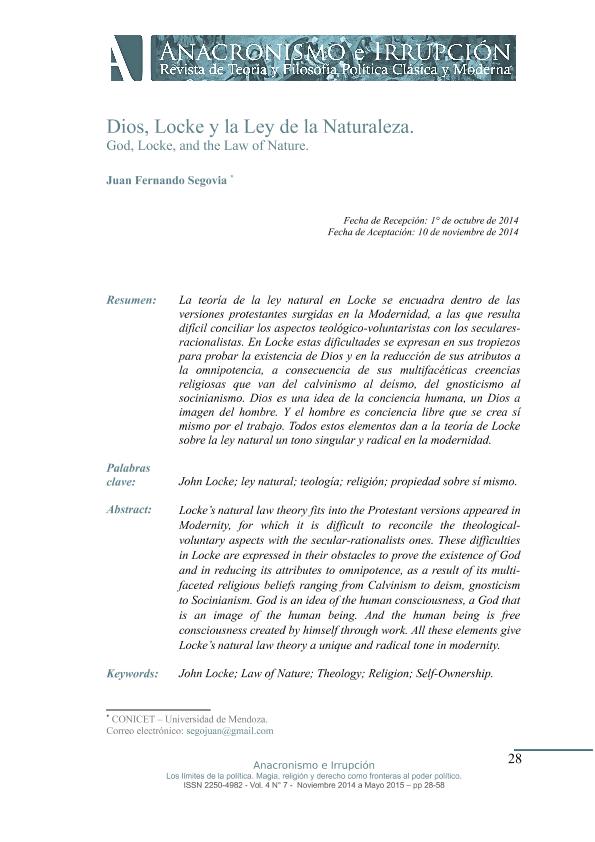Mostrar el registro sencillo del ítem
dc.contributor.author
Segovia, Juan Fernando

dc.date.available
2018-03-27T18:27:58Z
dc.date.issued
2014-11
dc.identifier.citation
Segovia, Juan Fernando; Dios, Locke y la Ley de la Naturaleza; Instituto de Investigaciones Gino Germani; Anacronismo e Irrupción; IV; 7; 11-2014; 28-58
dc.identifier.issn
2250-4982
dc.identifier.uri
http://hdl.handle.net/11336/40185
dc.description.abstract
La teoría de la ley natural en Locke se encuadra dentro de las versiones protestantes surgidas en la Modernidad, a las que resulta difícil conciliar los aspectos teológico-voluntaristas con los secularesracionalistas. En Locke estas dificultades se expresan en sus tropiezos para probar la existencia de Dios y en la reducción de sus atributos a la omnipotencia, a consecuencia de sus multifacéticas creencias religiosas que van del calvinismo al deísmo, del gnosticismo al socinianismo. Dios es una idea de la conciencia humana, un Dios a imagen del hombre. Y el hombre es conciencia libre que se crea sí mismo por el trabajo. Todos estos elementos dan a la teoría de Locke sobre la ley natural un tono singular y radical en la modernidad.
dc.description.abstract
Locke’s natural law theory fits into the Protestant versions appeared in Modernity, for which it is difficult to reconcile the theologicalvoluntary aspects with the secular-rationalists ones. These difficulties in Locke are expressed in their obstacles to prove the existence of God and in reducing its attributes to omnipotence, as a result of its multifaceted religious beliefs ranging from Calvinism to deism, gnosticism to Socinianism. God is an idea of the human consciousness, a God that is an image of the human being. And the human being is free consciousness created by himself through work. All these elements give Locke’s natural law theory a unique and radical tone in modernity.
dc.format
application/pdf
dc.language.iso
spa
dc.publisher
Instituto de Investigaciones Gino Germani
dc.rights
info:eu-repo/semantics/openAccess
dc.rights
Atribución-NoComercial-CompartirIgual 2.5 Argentina (CC BY-NC-SA 2.5 AR)
dc.rights.uri
https://creativecommons.org/licenses/by-nc-sa/2.5/ar/
dc.subject
John Locke
dc.subject
Ley Natural
dc.subject
Teología
dc.subject
Religión
dc.subject
Propiedad sobre Sí Mismo
dc.subject
Law of Nature
dc.subject
Theology
dc.subject
Religion
dc.subject
Self-Ownership
dc.subject.classification
Estudios Religiosos

dc.subject.classification
Filosofía, Ética y Religión

dc.subject.classification
HUMANIDADES

dc.title
Dios, Locke y la Ley de la Naturaleza
dc.title
God, Locke, and the Law of Nature
dc.type
info:eu-repo/semantics/article
dc.type
info:ar-repo/semantics/artículo
dc.type
info:eu-repo/semantics/publishedVersion
dc.date.updated
2017-08-23T17:29:01Z
dc.journal.volume
IV
dc.journal.number
7
dc.journal.pagination
28-58
dc.journal.pais
Argentina

dc.journal.ciudad
Buenos Aires
dc.description.fil
Fil: Segovia, Juan Fernando. Consejo Nacional de Investigaciones Científicas y Técnicas. Centro Científico Tecnológico Conicet - Mendoza. Instituto de Ciencias Humanas, Sociales y Ambientales; Argentina. Universidad de Mendoza; Argentina
dc.journal.title
Anacronismo e Irrupción
dc.relation.alternativeid
info:eu-repo/semantics/altIdentifier/url/http://publicaciones.sociales.uba.ar/index.php/anacronismo/article/view/1076
Archivos asociados
